
Talent Canada Addresses How Organizations Can Overcome Hate and Inspire Societal Change
June 30, 2021 | By Maryam Farag
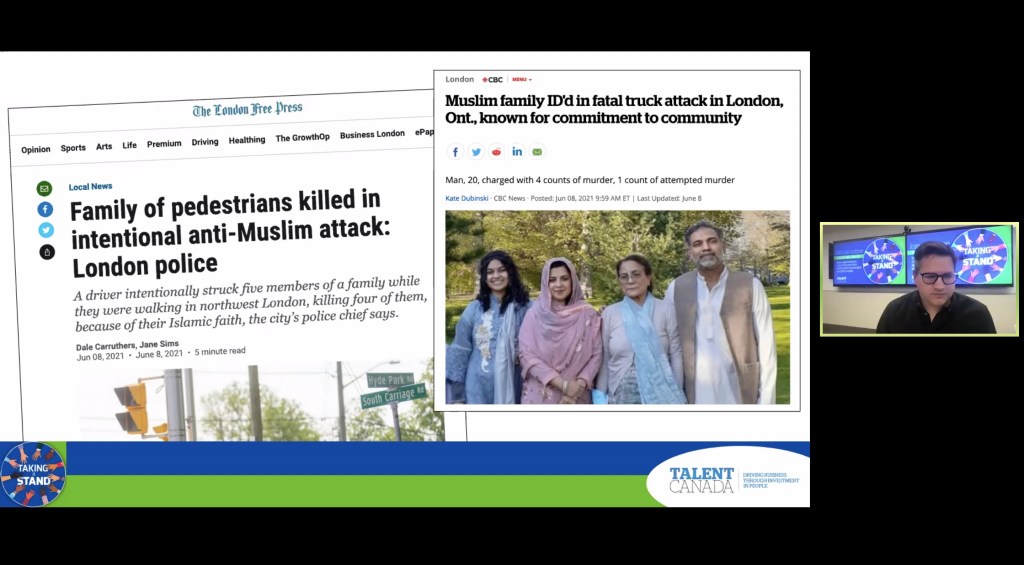 Photo: Talent Canada.
Photo: Talent Canada. 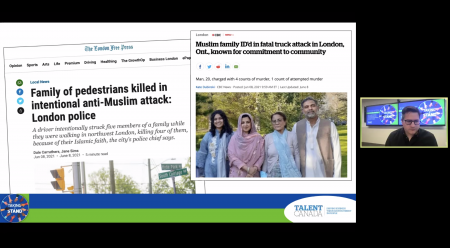
Photo: Talent Canada.
Talent Canada, a national media brand that looks at employer issues from a C-suite perspective, hosted a panel discussion, featuring a conversation with business leaders to discuss the way forward: What can organizations do to help eliminate hate in society?
The event has addressed the pickup-truck attack that took place in London, Ont. on June 6, killing four members of a Muslim family, and leaving a nine-year-old boy critically injured.
The panel discussion included: Mike Rencheck, President and CEO of Bruce Power, Chris Inniss, CEO of Pathwise Credit Union, and Nigel Branker, President and Executive Vice-President at Lifeworks.
Fatima Laher, Global Lead Client Service Partner and Board Director at Deloitte Canada, delivered a keynote, addressing how these types of incidents are a “stark reminder that Canada is not perfect,”.
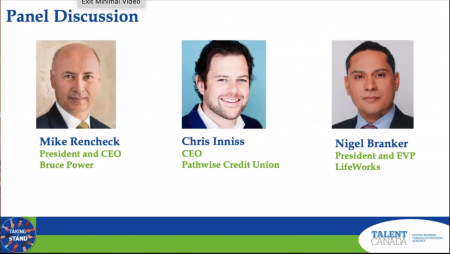
Photo: Talent Canada.
“In just the last month, in the land of the true north, strong and free, we have witnessed hate crimes against black, Asian, Jewish, Muslim, LGBTQ+ communities, finding the remains of 215-and-counting Indigenous children, and most recently a hate crime in London, Ontario that killed all but one member of a young Muslim family,” said Laher. “How did we get here, or shall I say, where do we go from here?”.
Todd Humber, Publisher of Talent Canada magazine, led the panel discussion:
Do you think that CEOs and senior managements have a role to play in addressing hate in Canadian society, and if so, how large of a role is it?
Mike Rencheck:
When we look at Bruce Power, we look at ourselves as an entity that can do good things for people. In 2019, we looked at our vision and mission statement and our values and we worked to align the company around the values of our folks. Our vision is to power the future. Our mission is to provide safe, clean, reliable, affordable electricity and life-saving medical isotopes to strengthen our communities, protect the environment, and secure tomorrow. It is that last piece that really builds around the values of our people, which is safety first, and performance, excellence and social responsibility. Those things resonate well with our people, and as a result, we take actions, both internally and externally, to make sure we’re doing the things we need to be doing.
We need to be diverse and inclusive, welcoming to everyone and build a strong community. I think organizations and companies alike need to start not only looking internally at what they do, but look externally at what they do and how they can contribute to better society.
Chris Inniss:
A CEO of any organization really needs to lead by example. We’ve been seeing a lot of really horrible things happening right in our backyard, either in Canada or in the U.S., with George Floyd and Brianna Taylor, and with the residential schools. I think as CEOs we need to make the shift from being not racist ourselves to being actively anti-racist, and I feel that our organizations owe it to society to not just not participate in those kinds of discussions, but to actively change the way that we do business fundamentally to meet the needs of our society.
I think no more can we say ‘Well, that doesn’t happen in Canada and my organization doesn’t do those kinds of things’. Being a white male in Canada, I’m super fortunate to not have experienced that type of racism, so I owe it to society and our organization owes it to society to make a difference.
Nigel Branker:
I think as senior leaders our job is to develop strategy to hit the objectives of our organizations that includes balancing the long-term and the short-term, and obviously it differs.
Mike’s business is different than Lifeworks, which is a global well-being firm, but I do think as a CEO, when it comes to inclusion and diversity, there does need to be a next executable strategy, both internally within the workplace and externally, and how you show up with your clients, partners and suppliers. In addition to role modeling, I do view the role of the CEO is to ensure that there is a plan in place, because as an organization it’s important that we’re doing something, both internally to make it a more inclusive environment in the workplace, but also in how you show up in the communities that you operate.
What went through your mind when the news out of London, Ont. broke – and how did you react? And what actions did your organization take?
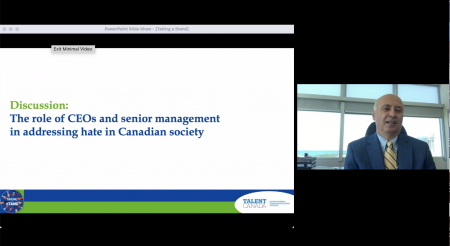
Photo: Talent Canada.
Mike Rencheck:
This is awful for us because it’s personal. One of our employees’ brother got killed, his family got killed, his family got stolen by someone committing a heinous act. We had to reach internally and do grief counseling and have some outreach in terms of support.
You can never undo the acts, and you can never undo the consequences of the acts. You help people move forward and progress forward, and we do that with positive thinking about how can we make the world a better place, and how can we do better things here from Bruce Power in our communities and all communities.
We’re also participating and raising funding for the young man that’s going to have to go on now and without his parents, without his grandparents, and without a sister.
Nigel Branker:
As part of extending our services we offered counseling to all the parents and the teachers at the school of the one survivor, and what we’ve heard through Muslim people in the London community, especially if they wear a hijab, they’re continuing to be very distraught over this, so we did what we can and I’m really proud of our EAP business on making those services available.
When I immigrated to Canada, I first moved to London, Ontario with my family and so I have my own experiences in London, and I think many of us who are people of colour that have lived there would be appalled at what happened, but not a hundred per cent surprised that racism lives in pockets.
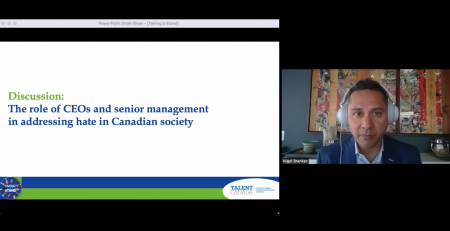
Photo: Talent Canada.
There was an Angus Reid survey that came out about a week ago: Muslims are the one segment that Canada feels coldest towards. I mean they may feel cold towards eight per cent of black Canadians, but Canada -as a whole- feels cold towards 24 per cent of Muslims. As a society, we don’t want them as neighbours, and those are the behaviors and sentiments that allow something like this to happen.
As I continue to reflect, I try to talk to a lot of the people on my teams that are Muslim to ask how they’re feeling, and a lot of them see themselves in that family. Five people tell me that they don’t feel as safe going out for a run or they’re thinking twice, and that’s the hard part about being part of a marginalized group.
The thought experiment for me was: imagine what would happen if a Muslim driver ran over a three-generational family? They would still have to deal with the backlash of the actions of their community, so it is tough.
I think we all have a role to play to really humanize this and to look into those dark spaces to see what we can do to shine light and eradicate these feelings of hate.
What’s working at your organization to stamp out overt racism or hate speech?
Chris Inniss:
For us it’s uh zero tolerance. It’s really easy to ignore just a little comment here and a little action there and it goes away very easily, but I know that our employees, or some of them, have had to struggle and some of them have been going their whole lives having these kinds of comments.
As leaders, we need to have empathy and that empathy is having zero tolerance whatsoever for any of those kinds of comments. I think education is important, but it has to go with holding people accountable for their comments and actions. It might be innocent, might not, but we don’t tolerate any bit of it around here.
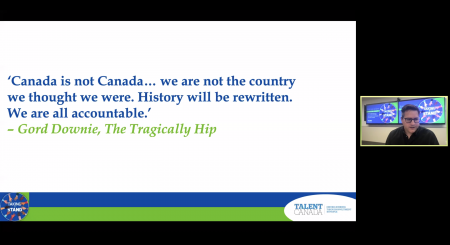
Photo: Talent Canada.
Humber ended the discussion by asking the panelists to provide concrete steps that organizations can take.
The panelists advised that organizations take steps to adopt sustainable development goals and work on them, and particularly the ‘reduced inequality’ goal. Also, instead of having the sustainable development goals only tied to the values of the organization, organizations can support charities that support these causes and goals.
Organizations should also focus on involvement and engagement; spending time listening to what your employees are telling you, and changing the organization’s vision and mission to be more reflective of the values of the employees.
“The short-term goals are always there; things like water sustainability and such, but it is the culture that is lasting, and if you can build a strong culture around some solid fundamentals, it can take you through the highs and it can take you through the lows in terms of how the business works or is operated or your financial outcomes or any issues you might have,” said Rencheck. “I would say what is the culture of your organization and how does it plug into what your people really value.”
